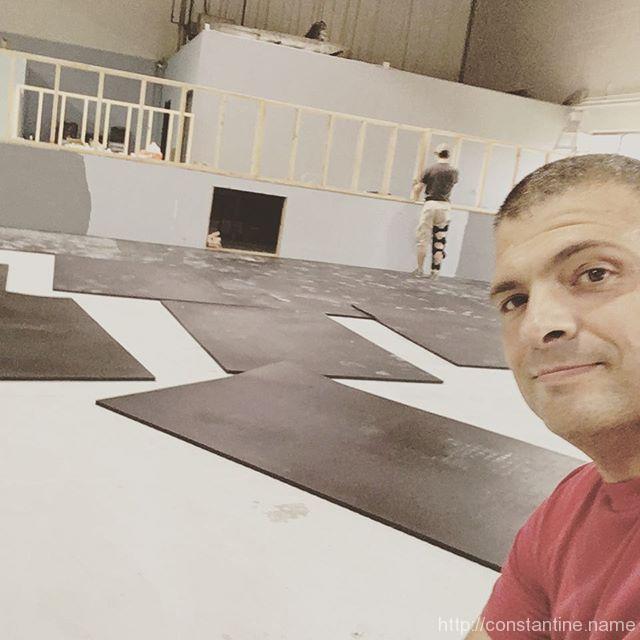
15 circuits of good ‘ol pushups, squats, and hanging leg-raises.
Everything has its wonders, even darkness and silence, and I learn whatever state I am in, therein to be content.
~ Helen Keller
slip:4a1249.
The moral? To recognize that our best chance of contentment lies in taking up the wisdom offered to us in coded form through our coughs, allergies, social gaffes and emotional betrayals, and to avoid the ingratitude of those who blame the peas, the bores, the time and the weather.
~ Alaine De Botton
slip:4a987.
Independent-mindedness seems to be more a matter of nature than nurture. Which means if you pick the wrong type of work, you’re going to be unhappy. If you’re naturally independent-minded, you’re going to find it frustrating to be a middle manager. And if you’re naturally conventional-minded, you’re going to be sailing into a headwind if you try to do original research.
~ Paul Graham from, How to Think for Yourself
slip:4upati1.
This is a case where I found it difficult to pull-quote. This at least gives you an idea of what the article is about. The challenge for me seems to be not becoming a raving lunatic when I’m off in independent-thinking land. I’ve learned to be able to swim in the conventional–minded, littoral waters, and I’ve been told I can even be helpful there. But my native environment seems to be the deep ocean of solitary thinking. I need to constantly remind myself that coming back to shore is important… as is doffing the raving lunatic appearance before trying to fold myself back into collaborative efforts.
ɕ
You are a human being; that is, a mortal animal capable of making a rational use of impressions. And what does it mean to use them rationally? In accordance with nature and perfectly. What is exceptional in you? Is it the animal part? No. The mortal? No. That which enables you to deal with impressions? No. What is exceptional in you is your faculty of reason.
~ Epictetus
slip:4a391.
Right now, “sedentary culture” is part of the broader, overarching culture, but subcultures—including our individual culture—can also be sedentary. These sedentary subcultures end up reinforcing the overarching culture, so what can we do? I’m (obviously) interested in working on sedentarism at the broadest cultural level, but I recognize that the most immediate benefits can be found by changing our personal culture. I’ve made working on sedentarism at this level part of my work as well.
~ Katy Bowman from, «https://www.nutritiousmovement.com/changing-a-sedentary-culture/»
slip:4unuca1.
Overall, the amount of activity [for Americans] has gone up slightly since the 1970s. The big issue is that our diet is killing us. Becoming more active alone isn’t enough—and Bowman’s take is nuanced, I’m not disagreeing with her article. But the first-order thing is diet. (I don’t mean “restriction” or “reduction” per se, I mean what specifically are you eating? That, “diet.”) That said, “eat better stuff” and “move around” is the prescription.
I’m reminded of, that room we all euphemistically call a living room: Would I call it my sedentary entertainment room, if I were honest? I realized that I should call it that, and so I rearranged the entire room, and got rid of the dedicated “tv” device. I still consume entertainment, but now it’s just one thing I can do in that room, rather than what the room is designed to be used for. We’ve done this, and continue to redo this occassionally, for every space inside and outside our home. For example: We don’t have a “second bedroom” nor “guest room”; We have [what we call] the “middle room”… and it’s got foam mats on the floor and random exercise, self-care, movement stuff… a finger-board over the door, a full-length mirror, a pull-up bar bolted into the ceiling, a chalk-board wall for tracking and notes… space for books. And the room also has a folding frame, air mattress, and bedding for the extremely rare guests who visit.
Frankly, there isn’t much in the way of “sedentary” left that I can trim out of my life. The vast majority of what I do is mental work. So I’m reading, writing and computing a lot. What’s left for me is to develop a healthy relationship to food. I get mental—over think, extreme thinking, stuck in my head… that sort of thing—and the way I’ve learned is the easiest escape is to run to entertainment. And to eat while being entertained. But, I’ve only learned that as being the easiest. There are a number of other things that also work to “fix” my thinking: Reading, writing, and physical activity can all work too. The hard part is changing my learned behavior. For me, it’s a matter of crafting my environment to encourage me to do things other than seek entertainment. (Learning to not mentally stress myself out would be even better, and I’m working on that too.)
ɕ
It’s a long to-do list that doesn’t translate into action. A spreadsheet where you gather information in order to forget about it. A long chain of thought culminating in an epiphany that goes nowhere. An argument about an issue that you never work on directly.
Bad planning like a belief in telepathy. It makes you feel like your private thoughts can change the world. The quintessential example? A college humanities essay that gets read by the student, the professor, and nobody else, but which the student remains proud of for the rest of their life.
~ “AllAmericanBreakfast” from, Change the world a little bit — LessWrong
slip:4ulepo15.
Planning, todo list management, goal setting… for me it all comes down to beginning with the end. What does “done” look like? What would a solution to this problem look like if I had a magic wand? When this is done what effect will it have [on me or the world]? Far too many people struggle with lists, and with getting things done—also with Getting Things Done. The real challenge is to figure out if the idea you just had pop into your head… is that a how to do something, or a what [as in, a goal] to do? If you have a how you really need to figure out that what. Because otherwise…
How are you going to figure out why you are doing anything that you are doing?
ɕ
Today, it’s alarmingly easy to find yourself antler-locked with some remote, faceless person who’s trying to tell you that universal healthcare is a communist plot, while you’re waiting for your potato to finish microwaving. This facelessness turns up our impulse to argue even more. You may have noticed it’s a lot less pleasant to argue with someone when you can see their eyes.
~ David Cain from, The Art of Letting Others Be Right
slip:4urate14.
I find it, in fact, so unpleasant to argue with people that I’ve effectively given up the effort entirely.
The first phase comes of self-reflection once you think you might—at least some of the time—be wrong. The second phase comes when you realize that your sometimes-wrongness might apply to the interactions with other human beings. Phase three is when you wonder why it is important to change the other’s mind. Phase four is when you stop judging people at all.
This has the side effect that you also give up trying to get people to stop arguing at you. If I don’t argue, then the other person assumes their idea has carried the argument, when in reality I’m focused on how delightful my iced tea is, or the weather.
I’m reminded of the ages of roots, fire, water and air that I mentioned a few days back; Once you start flirting with the age of air, the only person left to argue with is oneself.
ɕ
But there’s another way to do it, which is to turn down all the short cuts and try honesty instead. The bizarre thing about honesty, is that it actually makes you much richer than sneakiness, even while making you feel better about your work!
~ Peter Adeney from, Get Rich With: Good Old-Fashioned Honesty
slip:4umoge1.
All of my problems stem from over-simplifying things.
But, being honest with myself always cuts through my problems.
ɕ

MASSIVE work out putting in flooring all afternoon w a SUPER crew @pkgenlehighvalley @nikkie.zanevsky @jesse.danger
ɕ

Lunch break at Wegman’s…
ɕ

Liberty leads the people of France to victory; The Mona Lisa and her famous smile; The raft of the Medusa (a famous shipwreck); Venus sans her arms
ɕ

We spent most of the day wandering around the Louvre which is sorta mostly kinda no not really climate controlled. Today I learned the French are straight-up allergic to air conditioning.
ɕ

ɕ

I have, apparently, died and gone to heaven. We were walking, and everyone going the other direction was carrying baguettes… hmmmmm, might be a bakery ahead. carbs. more carbs. ohmagerdCARBS!!
ɕ

ɕ
Be so good they can’t ignore you.
Said during an interview on the Charlie Rose show after being asked his advice for aspiring performers:
Nobody ever takes note of [my advice], because it’s not the answer they wanted to hear. What they want to hear is, “Here’s how you get an agent, here’s how you write a script,” … but I always say, “Be so good they can’t ignore you.'”
~ Steve Martin
slip:4a1124.